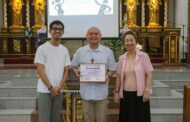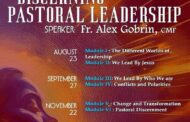THE ONE SOLIDITY that stands out in Cardinal Chito Tagle’s childhood is Mary. He went to school in Parañaque, run by Belgian priests, his early influence in faith, although his pious and working-class family always lived in Imus, Cavite where, at three years old, he could already recite the main prayers and the rosary. He was introduced to the block rosary tradition and knew Mary from that. The families of houses, where the statue of Our Lady of Fatima went around, always invited him to lead the prayers even if he was very young. He enjoyed it because it was an opportunity to go to people’s homes where, after the rosary, the families gave him a snack, a piece of cake or sweet. His love for her deepened and encouraged a devotion that took him to the heights of spiritual prosperity.
Who is Tagle?
Enzo Bianchi, prior of the Bose Monastic Community in Rome, Italy, says of him: “Tagle is a man of the Gospel who really knows how to talk about Jesus Christ.” The Los Angeles Times declares, “He has the charisma of John Paul II and the theological stature of Benedict XVI.” While John Allen, number one Vatican expert in the United States, says,” Tagle has the mind of a theologian, the soul of a musician, and the heart of a pastor.”
With these intense briefs about the man, it was inevitable to make him my next subject, a fitting accolade to the new year, to say nothing of an immense prayer to perish the pandemic. Having finished Fr. Haney’s “Stations of the Cross,” I returned it to the shelf and was gratified to find Cardinal Luis Antonio Gokim Tagle’s “I have Learned from the Least; My Life, My Hopes.”* The book is an autobiography of sorts, if you can call “the result of a dozen or so meetings and long interviews… in Rome and the Philippines” between the interviewers Gerolamo and Lorenzo Fazzini and their central character. The many questions that they put to the Cardinal in long, far-reaching conversations (where there was no lack of smiles and jokes from the interviewee), the latter all received, reviewed, reread, and corrected until the completion of the whole manuscript.
It is easy to understand why the interviewers are so enamored with the candid Cardinal. In their introduction, they were admittedly disarmed by the youngest bishop attending the Synod of the Eucharist in Rome who, their interview revealed, was a surprising man who combined theological depth with extraordinary pastoral sensitivity.
The “smell of the sheep”
This shepherd considers a great lesson of his pastoral life going to the poor. Not with his words but having a heart ready to listen and learn from them. Before saying anything, he says it is important to understand the person before him, understand him or her by listening respectfully in a way that also respects their dignity. Only after that does he feel he has the right to say anything. He has, of course, the word of God in mind, the social teaching of the church, which he will share with them, but the best way for him to draw the poorest people is through raising their dignity by listening to them. He said, priests and religious who are faithful to their spirituality and to the pastoral dimension of priesthood have a truly “human” face.
At festivals in the parish, there is lunch with the people after Mass, where the Cardinal dialogues with them and they tell stories of what is going on. There are also meetings with specific groups of poor people with problems who ask the church to intercede for them. These encounters, and sights of poverty, make him lose hours of sleep. So much so that the poor appear in his speeches. He is concered that children are sick and suffer from malnutrition, for street girls in a house that Pope Francis visited in Manila, and homeless families being made to get up early so that the gardens they slept on can be tidied up.
The lack of physical spaces, he says, forces the church to rely less on structures and more on life sharing. Because of his representations, and help from caring institutions like Caritas, various NGOs and mass media, many societies now give a space in their lives to his Sunday broadcast. A small but significant step towards opening their hands and hearts to reach out to their less fortunate siblings.
A doctor by ambition
In his adolescence, Cardinal Tagle wanted to become a doctor. He believed in it deeply and was interested in medicine to this day. But early in his schooling, the Scheut missionaries from Belgium, simple priests of the Congregation of the Immaculate Heart of Mary, with a genuinely humble lifestyle, often gave him books to read about the religious life, wanting to draw him in that direction. His parish priest and trusted friend, Father Corpuz, told him he’s too young to think about the priesthood. The young Tagle told him firmly he is not interested in it. After a while, Fr. Corpuz was transferred to a very poor parish in one of the most devastated areas of Imus. When he visited him, he felt sad for the priest because the latter was deeply involved in a wretched situation. That gave rise to a question in him why the young priest was “wasting” his life in a place where, in human terms, it’s not worth living.
Another priest took Fr. Corpuz’ place. This priest heard about the boy’s plan to study medicine and told him of a scholarship offered by Ateneo de Manila University. If his marks are high enough, the priest said, he can try the selection exam. Tagle took the very competitive exam. During the first test, he did not understand the question “Type of Vocation” so he asked the priest supervising the exam to explain. The answer that the priest gave stunned the young Chito: it was a normal question, seeing that it was an exam to enter the seminary. He was furious and felt betrayed by the priest.
He admits that he had seen clearly and, after his moment of fury, he was confused. What did he really want? And he remembered the mystery of Fr. Corpuz, his life of sacrifice, to devote himself to the poor. While he was trying to rid his mind of priesthood, and kept telling himself medicine is the way for him, he was hoping, deep in his heart, to pass the exam for admission to the seminary. That didn’t happen because he was too young at the time. And all the while, his parents did not know about this.
In his confusion, he prayed for the Lord’s help. And decided to go to university. He was in a queue for the faculty counter when the priest that supervised the three-day test saw and scolded him for going to his parish priest to plead his cause. He took him to his office and asked if he had any friends among the Cavite priests. That’s when he knew the priest and Fr. Corpuz had been classmates. The priest’s final decision, then, was he will accept Tagle into the seminary but “under supervision” for six months.
His parents were very surprised and somewhat aggrieved because he did not involve them in his worries but they accompanied him to the seminary. Long story short, he was ordained deacon on July 18, 1981 and priest on February 27, 1982.
He never doubted his decision, not because of the qualities and talents he had to offer as a priest, but because of the strange and convoluted story of how he became to be one. It made him understand that his vocation is real: his life did not belong to him!
A breath of faith
His grandparents and parents instilled in him a spirit of devotion to duty, taught him to work hard, do well something, be a good neighbor to others and, above all, the faith. He breathed the faith first of all in a family consisting of people who worked hard and brought him up with simple values of faith, family, love for the church, good manners and sound principles.
Piety and Tradition
On popular piety, he gives as an example the celebration of the Black Nazarene of Quiapo. The faithful who come together in the basilica are mainly from the poor areas, who find a fellow sufferer in Jesus. They want to touch the statue or even just clutch the rope that is tied to the statue. They are people who have nothing else to hold onto but Jesus. Thanks to the initiative of the parish priest and the local committee organizing the celebration, many of these devout, sick and suffering people now help others who are poor and sick. In this way, popular piety moves on from being a private individual phenomenon to become service and community action. Tagle stresses that he has been greatly helped by popular religiosity.
Simple like the Pope
Except for “The Word Exposed,” I knew little of Cardinal Tagle. So, it was immensely satisfying to discover some similarities between the Pope and the Cardinal. Like, as a young priest, Tagle lived simply. He did not have an office and met people wherever there was space. He didn’t have a car and always travelled by public transport from Tagaytay to Manila to teach Theology in San Carlos University and Loyola School of Theology. Even as a bishop with a lot duties, he kept up his teaching because it “forces” him to read, go to the library and explore theology. He believes that an educator must be a friend of the seminarians. Like a friend who knows the way and guides them with kindness, who listens and enables them not to hide the truth about their lives. When the seminarians regard a teacher or trainer as a judge, they shut themselves up within.
Like Mother Teresa
In America, in the 1980s, when AIDS began to claim its first victims, he touched the sick people’s wounds with his hands and also those of their families. One of their jobs as volunteers was to tell the family when a sero-positive person was going to die. They helped them with their prayers and then, when the patient died, they took care of laying out the body. One day, they told a family that their family member was about to die. When they arrived, they came out of the room almost at once, blurting out, “But he’s not dead yet! Call us when he’s dead.” It was a very sad case for Tagle. At that time, anyone who had contracted AIDS suffered a very strong stigma. For him, sitting by the beds of those sick people, who were often very lonely, was a religious experience, something that enriched him both pastorally and spiritually. He remembers when a person with AIDS came into the room of a sick person who was about to die and could no longer speak. He was at the bedside of the dying person and the AIDS patient said to the dying man, “When you meet Jesus, tell Him we love Him. We love you, too. Goodbye, dear friend.” That evening, those who were ill and suffering taught Tagle, a doctoral student, simple love and trust.
My Advent Recollection
I put Cardinal Chito down to pray the 6 pm Mass and attend an Advent Recollection afterwards. It was prefaced by an enigmatic “Will there be Christmas?” Which was an oblique shot at the pandemic, the universal phenomenon that levelled the world’s population. Christmas lights are only appreciated in the dark, at night, and lose their luster in the light of day. I imagined a beautiful night. One that doesn’t need the artificiality of Christmas lights. To make it bright. Because, true to the message of Jose Mari Chan’s popular ballad, the spirit of Christmas is really in the heart. The incarnation of Christ made the Nativity brilliant. Yet I sustain my Easter personhood. Unless consumerist Christmas loses its commercial luster and returns to the stark simplicity of the manger.
Tagle’s American experience
Tagle’s years in Washington were a prolonged experience on being inserted into a different culture. Living there for some years gave him a new insight into Filipino culture. Living away from his values and habits, he came to understand them better. Small things revealed to him the wonderful different ways of seeing the world. There, he discovered the influence that Ignatian spirituality had on his life.
Back in Imus
Returning to Imus from the United States, Tagle was very busy with various jobs: as rector for the seminary, he wrote a directory for seminarians and the first draft of the protocol for procedure in cases of abuse committed by the clergy; and he received many invitations from different people to give lectures. When he had the time, he still tried to work as a priest side by side with the poor. He also tried to keep close to them by his lifestyle, by not having a car but using public transport. He only began using a mobile phone when he was appointed bishop.
From Imus to Manila
A very obvious phenomenon in a great metropolis is that the church lacks territorial spaces for building new churches, pastoral centers, schools, gardens: no room! His bishopric discovered that the most important space in the task of preaching the Gospel is the human space, that is, people’s daily lives, as Gaudium et Spes puts it: “The joy and hope, the grief and distress of people today, especially the poor and those who are suffering, are also the joy and hope, the grief and distress of the disciples of Christ.” This is the proper place to preach the Gospel, as John Paul II confirmed when he said that, the way of the church is the same way that Jesus went, the human way.
In Tagle’s experience, the church does not lack human spaces: there are so many opportunities to preach the Gospel, in both senses, bringing the Gospel into people’s lives, but also, discovering the presence of the Spirit of the Lord in daily life. It is not just the church bringing Jesus to people, because Jesus is already present there. The church is called to make people aware of that presence.
Fast talk
In conclusion, the interviewers asked Cardinal Chito direct and simple questions which he gamely answered.
Q: Why are you a Christian?
A: Because I love Jesus
Q: In a word, who is Jesus for you?
A: Love.
Q: Why are you a Catholic?
A: Because the Catholic Church offers me fullness of life and community in God who is Trinitarian love.
Q: What is your episcopal motto?
A: Dominus est! It is the Lord!
Q: What would you change in yourself?
A: I’d like to have more patience.
Q: On the positive side, what aspect of your character helps you do your job?
A: I don’t take myself seriously. Certainly, I sometimes feel unhappy with myself. But I know I am not the savior. Jesus has already saved the world. That’s the reason I can smile and laugh, even when I don’t always do what I like to or should.
Q: Have you any hobbies?
A: I enjoy reading. I like detective stories. I also enjoy listening to music, especially classical music.
Q: If you had to save one book from your library, what would you choose?
A: Perhaps the Spiritual Exercises of St. Ignatius Loyola.
Q: Which passage of the bible is your favorite?
A: The appearances of the Risen Lord.
Q: Which biblical character do you identify most closely with?
A: The Roman centurion standing by the cross of Jesus.
Q: Who is your favorite saint?
A: St. Joseph.
Q: Have you ever had a crisis of faith?
A: It may seem strange that my crisis of faith is caused by the faithfulness of God’s love. I can’t believe that such a love exists, that God can love the least lovable person in the world. But this love exists, as the history of the world and humanity show. Seeing this incredible love, I believe in God.
Q: Any regrets?
A: Not having learned Chinese or any other language.
Q: Any dream you would like fulfilled?
A: That there might not be any more inhuman and dehumanizing poverty.
Q: What sin do you consider the most serious?
A: Idolatry. Because instead of worshipping the true God we worship false gods. And for these idols we sacrifice human lives and the integrity of creation.
Q: Do you think about death?
A: Yes, particularly when I feel weak and when I realize that my mental, psychic and emotional capacities are not as strong as they once were. Death is saying “goodbye,” letting go, but also expectant hope for those many who want to embrace and welcome us.
Q: How do you imagine the beyond?
A: A banquet! A banquet where everybody, especially the world’s poor, will have enough, not just of material food but also God’s justice.
Amen.










